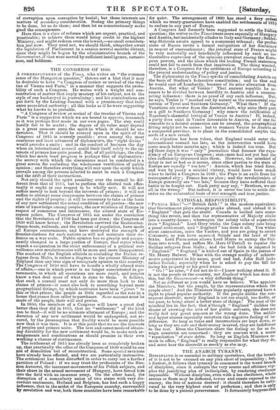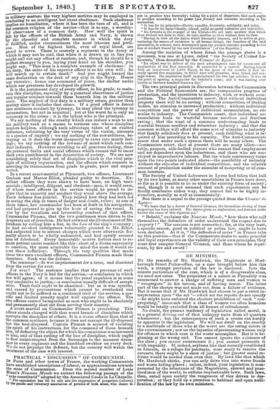THE ANARCH TYRANNY.
DISCIPLINE is so essential to military operations, that the breach of it is not to be excused on any plea short of impossibility; but, a fortiori, it follows that tyranny in command is the worst breach of discipline, since it corrupts the very source and ofttimes sup- plies the justifying plea of indiscipline, by rendering obedience impossible. Without discipline, even with a lax obedience, whole armies or fleets may be defeated, towns and coasts exposed to the enemy, the fate of nations decreed : it should therefore be culti- vated to the very highest state of perfection ; and that is only to be done by a patient perseverance. It fortunately happens that in military matters the very highest motives may be employed in conducing to an intelligent but exact obedience. Such obedience implies no humiliation, where it has been the turn of all, and is the common religion of the service—that is to say, a worship- ful observance of a common duty. How well the spirit is felt by the officers of the British Army and Navy, is shown by the cheerful and complete manner in which the duty is fulfilled, under circumstances the most irksome and peril- ous. Men of the highest birth, even of royal blood, are proud to serve. There is scarcely a regiment in the Army of which it may not be said, that when it is drawn up in line you might call out any officer at random, and, though he should be a perfect stranger to you, laying your hand on his shoulder, you might say, "This man is a complete example of obedience : in his duty, the order of his superior officer is as his own will; he will march up to certain death." And you might hazard the same declaration on the deck of any ship in the Navy. Hence our victories ; hence our command of peace, the shelter under which our greatness has developed its growth.
It is the paramount duty of every officer, in his grade, to main- tain this discipline, especially by a punctual observance of justice and regular conduct towards those beneath him in the military scale. The neglect of that duty is a military crime, greater than mutiny since it includes that crime. If a good officer is forced into mutinous conduct by tyranny, he may plead the tyranny in extenuation, but not in acquittal; yet at the worst he is only an accessory to the crime : it is the tyrant who is the principal.
We say nothing of the cruelty which can induce a man to use his military rank as a means to torment one whom discipline renders helpless, although such advantage taken of an exalted influence, subsisting by the very virtue of the victim, amounts to a species of impiety ; we say nothing of the cowardliness, be- traying as it does the worst incapacity to enter into manly feel- ings; i we say nothing of the lowness of mind which such con- duct indicates. However revolting to all generous feeling, these are personal faults and social offences which cannot fail to incur their own punishment in the detestation of society. We are now considering solely that art of discipline which is the vital prin- ciple of military organization, and the offence which consists in arresting its transmission from grade to grade, pure and unper- verted.
In a recent court-martial at Plymouth, two officers, Lieutenant Graham and Master Elliot, pleaded guilty to desertion. Ex- cellent officers they were shown to have been, on high testi- monials; intelligent, diligent, and obedient—men, it would seem, of whom most officers in the service would be proud to de- clare that in capacity and conduct they stood above the average. Their defence was painful. They related how they had both led in saving the ship in times of danger and doubt, twice; at one of those times, her commander had been at fault in his navigation, and had prepared to give up the hope of saving the vessel. It was by the vexatious and tormenting conduct of that officer, Commander Pitman that the two gentlemen were driven to the desperate act of desertion. He had crowned the ill-treatment of Mr. Graham by calling him a liar, in the face of the ship's company ; he had revoked indulgences voluntarily granted to Mr. Elliot, had subjected him to serious charges which were afterwards for- mally shown to be wholly unfounded, and had openly accused him of falsehood. Every honourable motive forbids men to re- main patient under conduct like this : short of a divine superiority to emotion, the more admirable the mind the more it would re- sent these inflictions. Through the very qualities that made these two men excellent officers, Commander Pitman made them deserters. Such was the defence.
The sentence?—It was imprisonment for a term, and dismissal from the service for ever.
For ever ! The sentence implies that the presence of such officers in the Navy is bad for the service,—a conclusion in which few will agree; or it means that the penal expulsion is in some way conducive to justice,—a conclusion equally difficult of accept- ance. Their fault ought to be chastized : but as it was specific, and caused by provocations which cannot be overlooked and ought not to be suffered as a continued trait of the service, a spe- cific and limited penalty might well expiate the offence. The two officers cannot be regarded as men who ought to be absolutely and permanently shut out from serving their country.
A court-martial on Commander Pitman is proceeding. This officer stands charged with that worst breach of discipline which corrupts the discipline of others. It is a worse offence than that of the common mutineer, because it does not corrupt the ill-disposed but the best-disposed. Captain Pitman is accused of violating the spirit of his instructions for the command of those beneath him, of defeating the object for which his commission was intrusted to him, and of thus cutting off the line of discipline, which ought to flow uninterrupted from the Sovereign to the meanest drum- mer in every regiment and the humblest swabber on every deck. We do not prejudge the defence, but the country will watch the treatment of the case with interest.



























 Previous page
Previous page